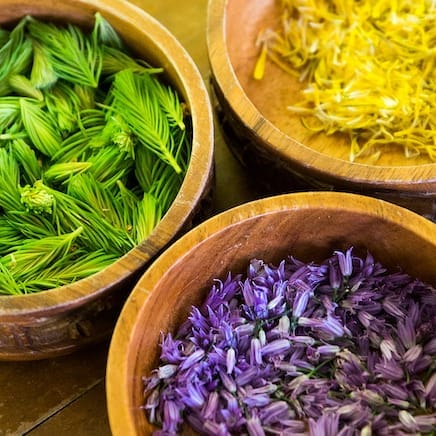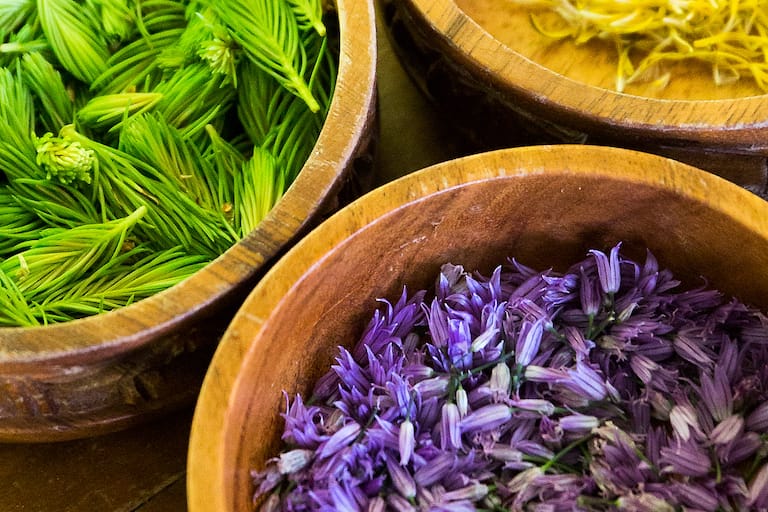On This Page
We welcome you to read through this page for a whole-picture perspective on the Wildcrafted Apothecary Class. If you’re looking for specific information, you can use the following links to skip around :
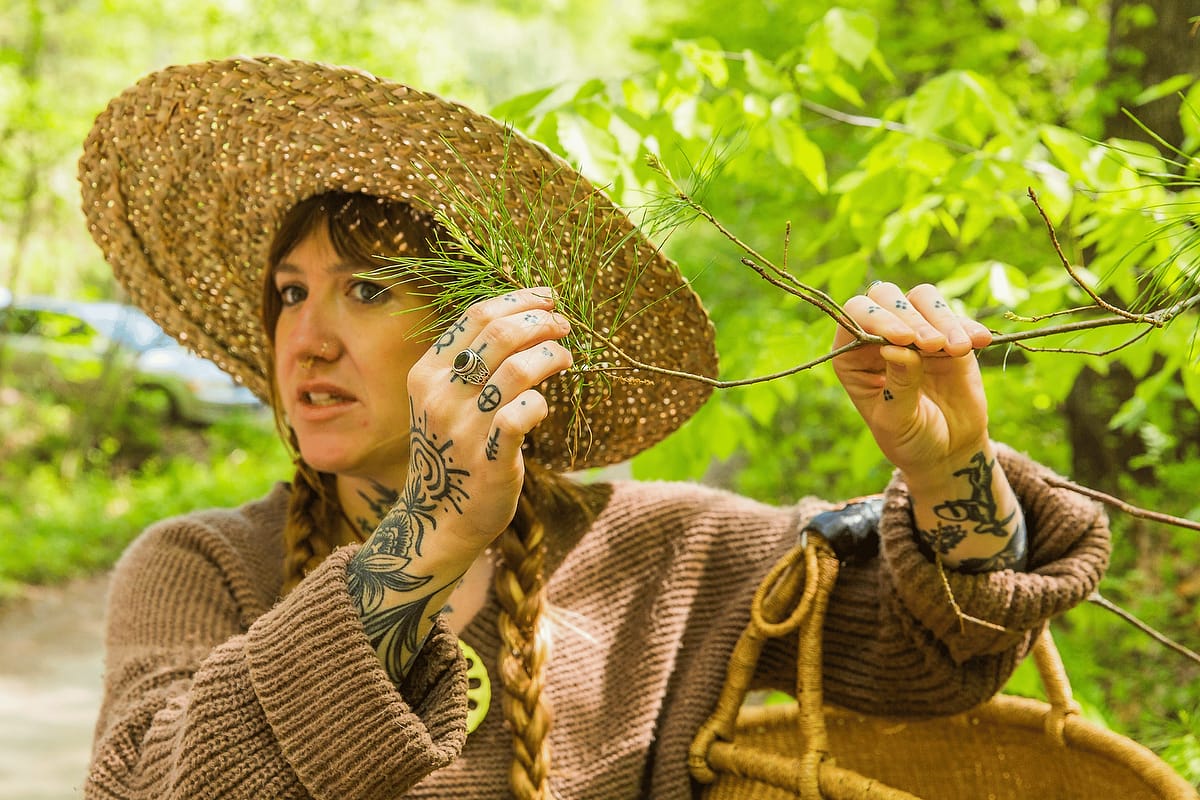
Making plant medicine: Learn how to wildcraft herbs & use plants for food and healing in our herbal apothecary classes.
Do you want to take the power of healing into your own hands?
If so, this wildcrafting and herbal medicine making course is for you. You’ll feel empowered to identify and utilize plants—both wild and homegrown—for healing and vitality. Making your own plant medicine straight from the wild allows you to heal yourself and your family, without always needing to go to the doctor, the pharmacy, or herbal apothecary.
Do you want to learn to work with plant allies?
Join our inspired and experienced team of herbalists, wild food experts, and ethnobotanists for our four-day wildcrafting and medicinal herbs apothecary classes. You’ll leave with a basket full of homemade medicines (made by you!) to add to your own herbal apothecary and you’ll learn how to make more—from plants growing all around you.
Are you drawn to wildcrafting, but feel intimidated?
It’s natural to feel cautious about wildcrafting. We include important discussions on safety, plant identification, and poisonous look-alikes in this class so you can confidently and capably begin wildcrafting.
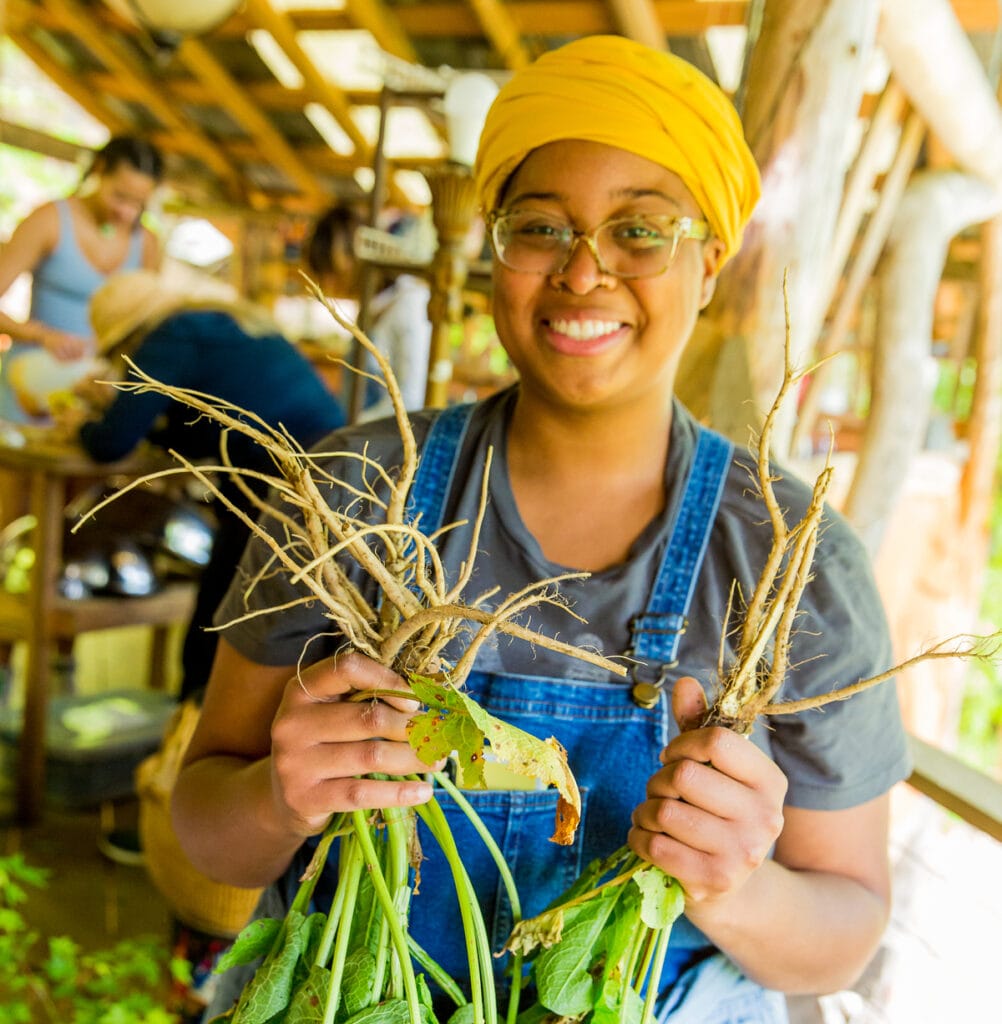
What Our Herbal Apothecary Class Students Say
scroll right to read more
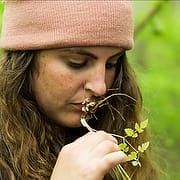
Jackie
Cornwall, NY
U.S. Army
“My experience in this class completely changed the course of my life. After being overseas for a year, it really helped with my transition back home—I found myself falling back in love with nature, plants, the wild, and community as a whole.”
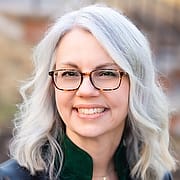
Caroline
New Jersey
Acupuncturist
“It was an amazing weekend with so much information from really talented and generous teachers. It surpassed my expectations in so many ways: from the knowledge shared to the practical experience I can apply to my everyday life. The plant walks, the stories, the open flame cooking, and medicine making were all engaging and special, even for me—a long-time practicing herbalist and teacher myself!”
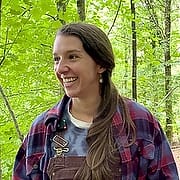
Jeanne
Crosby, TN
Nurse
“This class was a full immersion, yet also very attainable and full of connection. The teachers were phenomenally knowledgeable, the other students were so genuine and friendly, and I feel closer to the plants now than ever before. “

Ali
North Carolina
Writer
“My time in the Wildcrafted Apothecary Class was beyond all expectations. I left with a wealth of knowledge from different perspectives and traditions that has already deeply changed my relationship with the land where I live.”
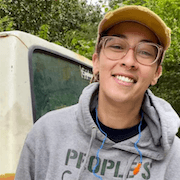
Lexie
North Carolina
Medical Laboratory Technologist
“Becky is so down to earth, warm, and welcoming. This class has transformed how I experience nature and taught me a plethora of useful information on how to utilize local, foraged plants. I am so excited to learn and experience more in future classes!”
What to Expect in our Wildcrafted Apothecary Classes:
Starting with wild plant walks, you’ll learn the traditional uses of medicinal herbs and how to prepare herbal honeys, cordials, tinctures, oxymels, decoctions, infusions, salves, and more.
Learn how to stock your own herbal apothecary with handmade and wildcrafted medicines.
We’ll cover plant identification and the ethics and safety of harvesting, along with wild foods cookery and historical plant-lore.
At the beautiful and lush Wild Abundance Sanford Way Campus, we’ll explore both wild and cultivated medicinal herbs and wild edibles. Experienced herbalist instructors will guide you in learning how to make herbal medicines to fill your apothecary. When these knowledgeable teachers walk you through how to make herbal preparations, you’ll feel confident making your own after class.
Delight in wildcrafting with the delicious, healing gifts provided by the plants.
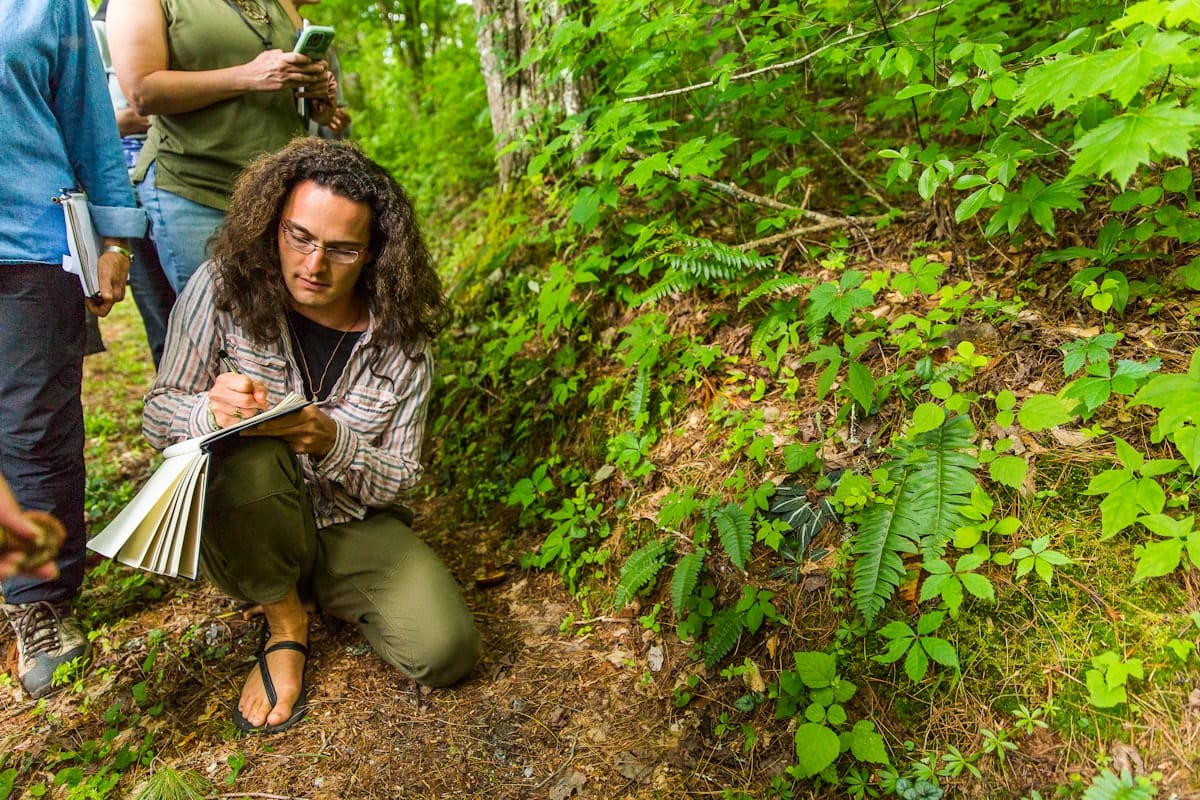
Ready to Join?
You’ll also receive our newsletters
Explore an exciting array of skills and subjects. These hands-on apothecary classes cover:
Plant Identification
You’ll learn how to get to know wild plants, even if you’ve never met them before, plus how to ID common medicinals and NOT confuse them with poisonous plants. You don’t need an extensive knowledge of botany to learn these essential skills!
Ethical Wildcrafting Practices
We’ll cover how to harvest wild plants responsibly and help maintain healthy wild plant populations through wild tending. You’ll also learn about which plants are important to local Indigenous communities and how to be sensitive to them.
Growing and Propagating Medicinal Herbs at Home
You’ll learn how to propagate medicinal plants for your own herb garden at home in our herbal medicine and apothecary classes.
Wild Foods Preparation and Cooking
We’ll explore how to confidently forage and cook with wild foods, turning them into delicious meals.
Herbal Medicine Making and Herbal Apothecary Stocking
Check out the list below to see the impressive array of herbal medicine making skills you will develop during the class.
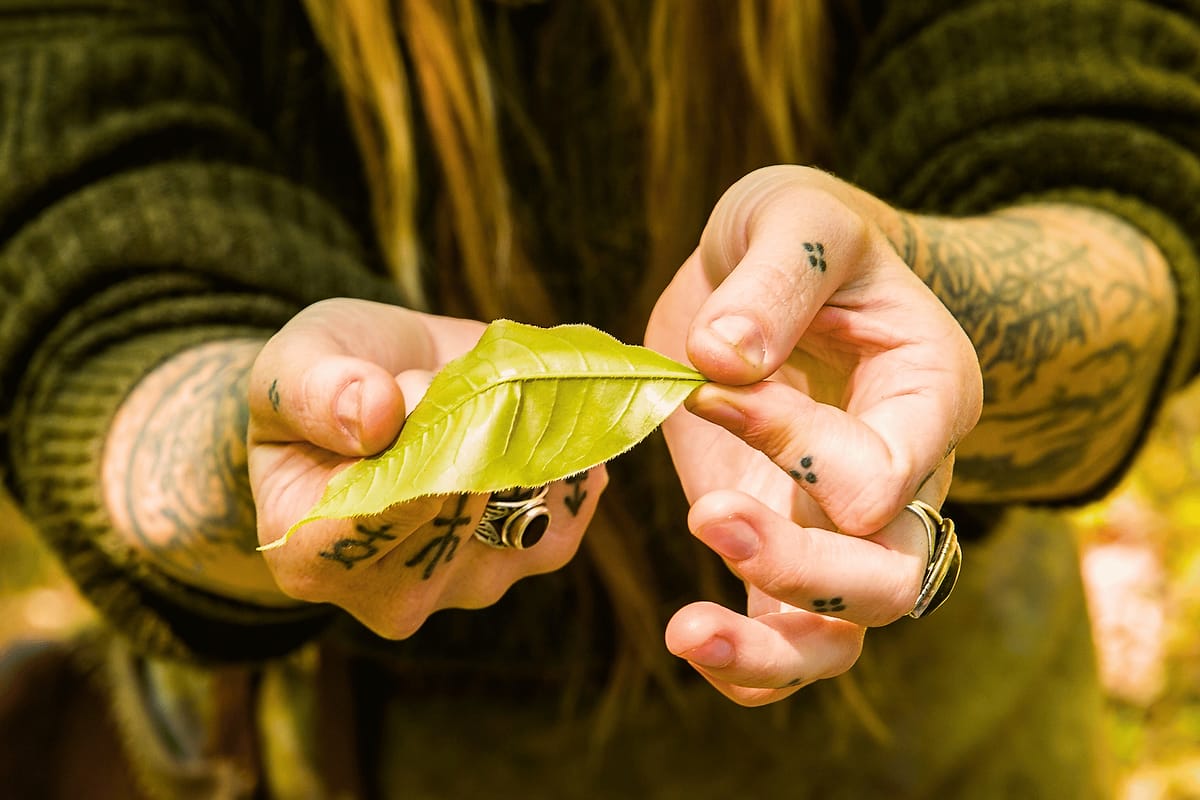
Learn how to stock your apothecary with these handmade preparations:
- Herbal Salves: topical medicine for skin healing
- Herbal Tinctures: concentrated, shelf-stable plant extracts infused in alcohol
- Herbal Liqueurs and Cordials: fun and scrumptious healing drinks
- Herbal Honeys: sweet preparations that can be stirred into tea, made into syrups, or taken by the spoonful
- Oxymels: tasty herbal tonics made with vinegar and honey
The fields and forests become your pharmacy and market when you learn the skills of wildcrafting and making plant medicine.
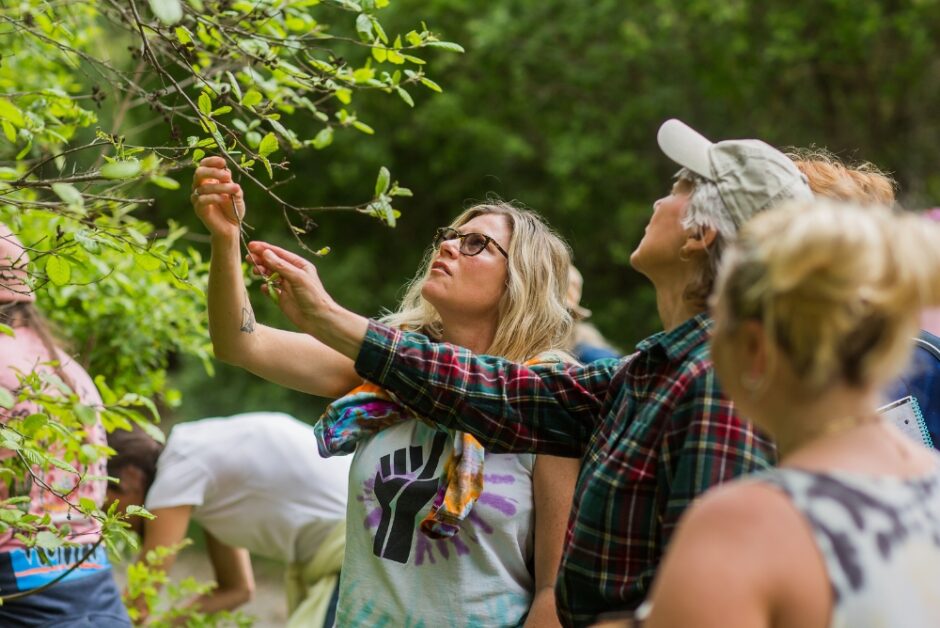
This herbal medicine course will help you bring plants into your kitchen and daily life.
Our students leave feeling equipped to wildcraft herbs themselves and inspired to incorporate these plant allies into their daily lives. Many herbal medicine courses focus on basic practices like making plant medicine and herb harvesting; we go a step further.
Our team of instructors—plant lovers who have been wildcrafting for years— have real relationships with the herbs you’ll meet and use them effectively in their lives and clinical practices.
Throughout this medicinal herbs course, they’ll share with you wider reflections like: how they make time to get out into the woods to wildcraft; guidance for growing herbs even if you don’t have a garden; recipes for herbal delights that can be consumed daily as food and aren’t just for acute conditions; and so much more.
We’re excited about plants (can you tell?), and we can’t wait to share them with you.
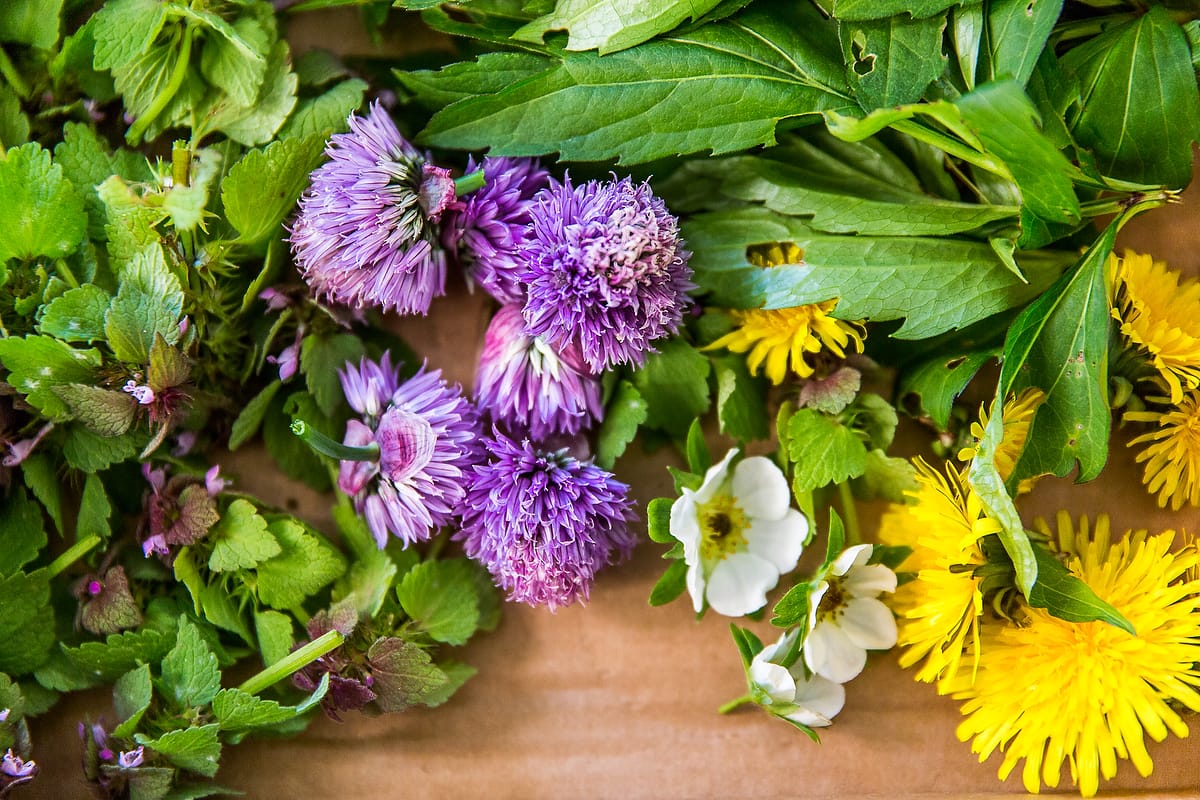
During our herbal medicine courses, we’ll forage wild foods and make delicious, nutritious, and medicinal herbal preparations to enjoy together.
- Infusions: Easy, tasty teas made from leaves and flowers steeped in hot water.
- Decoctions: Rich, flavorful teas made from leaves, barks, roots and berries, slow-simmered to perfection (think herbal spiced chai, yum!).
- Traditional wild plant delicacies: Cooked dishes based on traditional preparations of the wild plants of these ancient mountains.
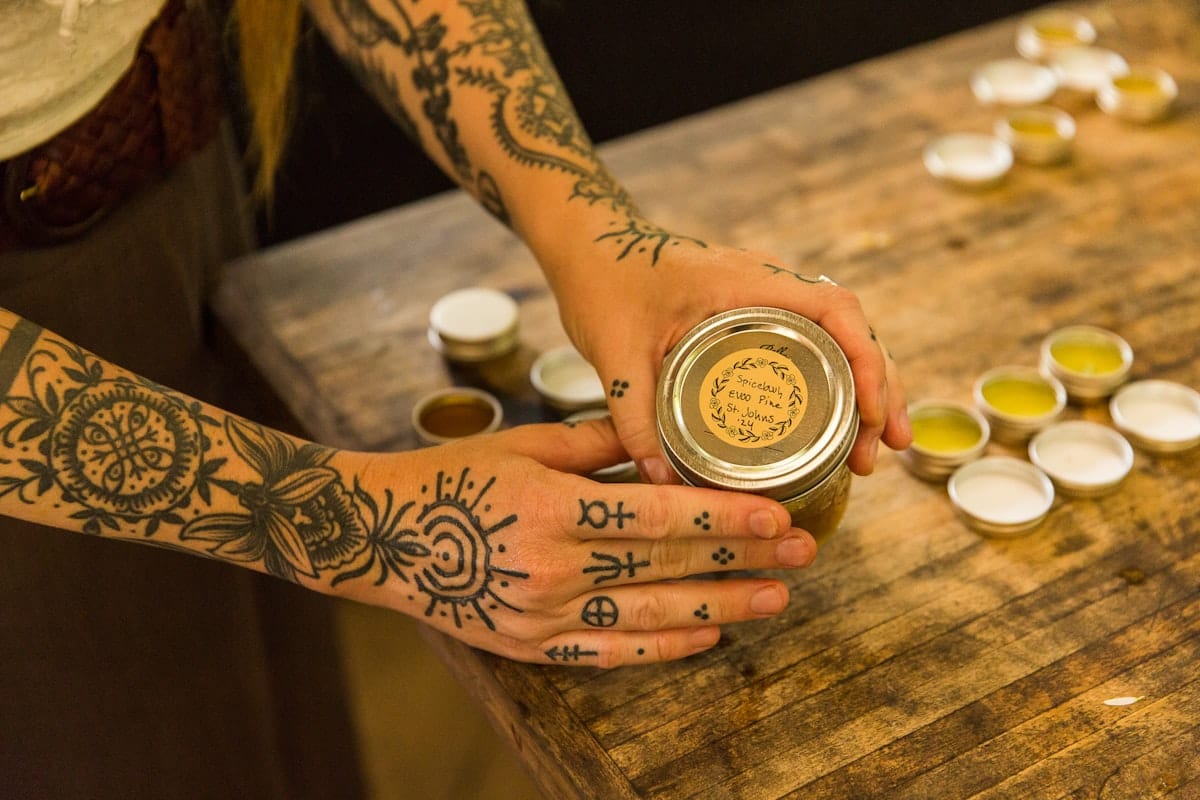
Frequently Asked Questions about the Wildcrafted Apothecary Classes
Wildcrafting is similar to foraging, but usually refers to the gathering of medicinal plants and fungi, rather than food plants and fungi. However, the two words are often used interchangeably. To wildcraft herbs, we traverse wild places and identify and harvest healing allies. We do this with care not to disturb wild populations.
Foraging for food means traversing and exploring the physical world in search of plants (or fungi) that provide sustenance. According to behavioral ecology theory, foraging affects an animal’s fitness because it plays an important role in an animal’s ability to survive and reproduce. It’s true that we humans have been able to survive without foraging for food, but we believe this ancient practice has an undeniably positive impact on physical, mental, and emotional wellness! Check out our Asheville Foraging Class page to learn more about foraging and our other foraging related class offerings.
This herbalist course will give you the skills to harvest and prepare wild and cultivated plants to stock your own herbal apothecary. You’ll learn many of the foundational skills every herbalist needs. We do not offer a certification because there is no official certification for herbalists in the US at this time. You can learn much more about herbal certification in a detailed article from our friends at the Chestnut School of Herbal Medicine: The Truth About Herbalist Certification.
The medicines you’ll learn to make in this medicinal herbs course are safe to use and share with most people. Your instructors will alert you to any contraindications (situations where a given herb or medicine might not be advised), and will also guide you to make safe choices in your future medicine making endeavors. When you take care to understand herbal properties and contraindications, and use the techniques you’ll be taught during this class, herbal medicines from your home apothecary can be safe to use and share.
Throughout this herbal medicine course and apothecary class, you’ll learn a number of skills essential to every herbalist and wildcrafter, including:
- How to identify and wildcraft herbs
- Safe and ethical wildcrafting practices
- Wild foods and open-fire cooking
- How to make herbal medicines (tinctures, teas, salves, honeys, and more)
- How to grow medicinal plants at home
Best of all, you’ll do this under the guidance of expert instructors who have been teaching students about herbs for years, who own their own plant-based businesses, and who are passionate about wildcrafting, wild food, and herbal medicine.
In many ways, studying herbs is just like studying anything else; you learn the body of knowledge that has been cultivated by many generations of herbalists before you. However, in other ways, studying herbs is different. This is because medicinal herbs are living beings, and because different people with different backgrounds and experiences have different ideas about how to use them. This medicinal herbs course is a great place to begin or deepen your study of herbs, because it involves sharing information, as well as lots of hands-on relating with the herbs themselves.
We welcome a wide range of students to our Herbal Medicine and Apothecary Classes, which makes each retreat a unique experience. Participants with diverse ages and careers join us from around the country, coming together for four days of immersive herbal learning. Many of our students reflect how valuable it is to meet other people with shared interests; our instructors create a learning experience that fosters connection and friendship. You’ll leave the workshop with a new network of plant people in your life!
Instructors
Rebecca Beyer
Tyson Sampson
Kearsley Tate Schweller
Brandon Ruiz
The Wildcrafted Apothecary Classes are held near Asheville, NC, at the Wild Abundance Sanford Way Campus
Wild Abundance’s original home campus is on Sanford Way in Barnardsville, NC. It boasts many gorgeous and functional features, like a leaf-shaped organic permaculture garden, a food forest, a hand built log cabin, an open-air classroom topped with solar panels, and a stunning wattle and daub outdoor kitchen.
Please note: our campuses are all unconventional, with rustic amenities and uneven ground. Read more about Planning your trip and about our campuses. It takes about 25 minutes to get here from Asheville.
You’ve got several options of where to stay during your class. Some students camp, some locals commute, and others choose to rent accommodations with more creature comforts.
Onsite camping (with your own warm bedding and rainproof tent or hammock) is available for free to all students (including locals) during class. Some set-up-for-you tents are available with cots and cozy bedding for a flat fee.
Campers and all students have access to a lovely outdoor kitchen equipped with a stove and hot and cold water, plus pots and pans, knives and cutting boards, bowls, plates, and utensils, along with an outdoor shower with hot and cold running water and outhouse. If you’d rather rent a hotel, house or cottage, there are many available. We’ll share a curated list of nearby options once you’ve registered.
So you can better plan your trip to come learn with us, here’s some info on accommodations we offer, or that we link to in the student handbook you’ll receive upon registration. Below it you’ll find info on transportation.
- Camping with your own gear: free
- Staying in a large tent with a cozy cot and bedding that we set up for you: $200 flat fee; you can stay there anytime from 5pm before the first day of your class, to 12pm the day after your class ends.
- Hyper-local off-campus single rentals: $40-$2000/night + fees
- Hyper-local off-campus couples rentals: $20-100/person/night + fees
- Hyper-local off-campus group rentals: $25-$86/person/night + fees
Wild Abundance students are given awesome discounts at a local hotel, and a hyper-local inn. More information given in the student handbook upon registration.
Getting a place or renting a car with a group of fellow students and carpooling are great ways to make connections and reduce costs! We share contact info for each class so you can get in touch and make plans together. Everyone has a chance to keep their info private if they choose.
Our campus is about 25 minutes north of Asheville, 40 minutes from the Asheville Regional Airport, and 2.5 hours from the Charlotte International Airport. You’ll get detailed directions of how to get here upon registration.
You won’t need a car during your class. There’s a chance you may want to run an errand or go out to dinner with fellow students, and if this happens, it’s highly likely that another student with a car will be happy to give you a lift.
We’ve also got a list of folks who will do airport and grocery shuttle runs for $50-$80 each way. We share this information in the student handbook when you register. If you’d rather rent a car, those run anywhere from $45-$200/day. Just like with lodging, teaming up with a group of fellow students to share a car rental can help build connections and reduce costs.
Pricing for Our Wildcrafted Apothecary Classes
Regular Pricing: $800-1600
*Please pay what you can within this range. The median price helps cover the class costs. Choose the low end if you’re low income, or the maximum fee if your household earns over $115,000/year. Place yourself within this range based on your income.
